Table of Contents
NPCI New Rules for UPI: NPCI’s New Circular on Levy Charges means that PPI wallets are now included in the interchange fee system, which is typically associated with card payments to cover transaction costs. NPCI New Rules for UPI is important for UPSC Prelims Exam 2023 and UPSC Mains Exam (GS Paper 3- Indian Economy).
NPCI New Rules for UPI in News
Recently, the National Payments Corporation of India (NPCI) has notified banks through a circular that they are allowed to impose fees on merchant transactions carried out via Prepaid Instrument wallets utilizing UPI.
NPCI New Rules for UPI, Applicability on PPIs
The NPCI has released a statement further clarifying that regular UPI transactions between banks will remain free of charge, and customers will not be charged for making transactions through PPI on UPI.
- The NPCI explained that the newly introduced interchange fees will only be applicable to merchant transactions made through Prepaid Payment Instruments (PPI).
- This change means that PPI wallets are now included in the interchange fee system, which is typically associated with card payments to cover transaction costs.
Prepaid Payment Instruments (PPIs), Definition and Usage
Payment methods known as Prepaid Payment Instruments (PPIs) allow users to buy goods and services and conduct money transfers using stored value in a wallet.
- To use a PPI, users must pre-load the wallet with the desired amount, which can be added through cash deposits, debit to a bank account, credit or debit cards, UPI, or other approved payment methods in India.
- PPIs are limited to Indian rupees and can take the form of mobile wallets, physical smart cards, secure tokens, vouchers, or any other method that permits access to prepaid funds.
Need for New NPCI Rules for PPI Interoperability
Previously, using a Prepaid Payment Instrument (PPI) at a merchant required a direct tie-up between the specific PPI issuer’s network and the merchant. PPIs from issuers without a direct partnership with a merchant would be rejected.
- The most common type of PPI used in India is the mobile wallet, which meant that users could only spend money at merchants who accepted the same PPI wallet provider’s QR codes, such as Paytm or Mobikwik.
- To address this issue, the Reserve Bank of India (RBI) has made interoperability mandatory between different PPI issuers.
- As a result, PPI issuers have partnered with the National Payments Corporation of India (NPCI) to issue interoperable RuPay PPI cards or create interoperable wallets on the UPI platform.
- This means that prepaid instruments in the form of wallets can now be linked to UPI, creating interoperable wallets on UPI rails.
PPI Interoperability though UPI
Once a customer has linked their PPI wallet to UPI, they can conduct transactions using the Scan and Pay feature on all UPI interoperable QR codes. This makes it possible to use PPI wallets at any merchant location and send or receive money to and from any other wallet user.
- In the same vein, any merchant with a UPI QR code can now accept payments from any PPI issuer or mobile wallet.
- PPI on UPI will accelerate the expansion of merchant transactions in rural areas and enhance digital financial inclusion by catering to various use cases, such as healthcare, transit, education, utility bills, and more.
Interchange Fee on PPIs and Impact on Merchants
Previously, merchants accepting PPIs such as mobile wallets or prepaid cards were required to pay charges to the PPI issuer. With the new changes, charges have been standardized at a network level, but each merchant can still work with their preferred acquiring entity.
- Starting from April 1, 2023, an interchange fee of up to 1.1% will be levied for using prepaid payment instruments (PPIs) like gift cards or wallets for transactions on UPI, but only if the transaction exceeds ₹2,000.
- If a merchant is accepting UPI payments directly from a customer’s bank account, no charges will apply.
- Charges will only be applicable if the merchant has accepted or consented to transactions made using a PPI wallet.
NPCI New Rules for UPI, Impact on Customers
Customers are not officially required to pay any charges. However, merchants have the option to pass on the additional burden to customers by increasing prices or using other means.



 TSPSC Group 1 Question Paper 2024, Downl...
TSPSC Group 1 Question Paper 2024, Downl...
 TSPSC Group 1 Answer key 2024 Out, Downl...
TSPSC Group 1 Answer key 2024 Out, Downl...
 UPSC Prelims 2024 Question Paper, Downlo...
UPSC Prelims 2024 Question Paper, Downlo...




